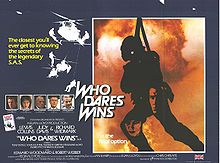
WHO DARES WINS
UK, 1982, 125 minutes, Colour.
Lewis Collins, Judy Da vis, Richard Widmark, Edward Woodward, Robert Webber, Tony Doyle, John Duttine, Kenneth Griffith, Rosalind Lloyd, Ingrid Pitt, Norman Roadway, Maurice Roeves, Patrick Allen. Directed by Ian Sharp.
Who Dares wins is an action adventure from the team that made The Wild Geese, The Sea Wolves. Producer is action man Euan Lloyd. Screenplay is by Reginald Rose who wrote the former films as well as classics of the past including Twelve Angry Men. Direction is by Ian Sharp of the television series The Professionals. Star Lewis Collins comes from this series as well.
The film has a strong cast: Judy Davis sporting an uncertain American accent as the 'heroine', Richard Widmark as the American Secretary of State, Edward Woodward as the Scotland Yard anti-terrorist squad commander. There is quite a strong British supporting cast.
The film was based on the S.A.S. breaking of the siege by terrorists of the Iranian Embassy in London. The film received negative reviews - from the playing of the cast to the seeming right-wing attitudes of the makers in the presentation of S.A.S., might is right and the impersonal penetration of the terrorist group by the S.A.S. specialist. The film is rather talkative although it gives some insight into the strong training and background of the S.A.S. and one can only be amazed at the speedy breaking of the siege.
1. The success of the film as action adventure? Topical? Entertaining? The political background - Britain, the United States? Terrorism, S.A.S. terrorist-smashing groups? Nuclear warfare and protests? Big business and the infiltration of terrorist groups?
2. The details of S.A.S. training and missions? The basis of the Iranian Embassy siege? An accurate or over-dramatised picture of terrorism?
3. The British background, the London settings - for international terror, for crack English squads? The British feel of the film? Americans: terrorists and politicians in England? Location photography, the Welsh sequences for the training? Power control, Scotland Yard, the media? The special effects and editing? Musical score?
4. The title and its tone, the S.A.S. motto, attitude? The background of the world situation, nuclear threats? Terrorism and protest? International power-broking, politics and big business, money? Diplomacy and its strengths and limitations? The ingenuity of the S.A.S. and politicians? The ingenuousness of diplomacy and terrorism? The proper place of protest? Governments held to ransom? The cold war and attitudes of East and West? Hypocrisies, conservatism, heroics? Violence and the responsibility for violence? The place of public opinion?
5. Plausibility of the plot? Protest, nuclear deadlocks, the threat of a nuclear explosion as protest? The basic situation, the siege of the American Embassy, the characters and their motivation, action?
6. The dramatised portrait of the terrorists: the individuals ami fcteir motivations, styles? As characters? How well drawn? The group, motivation, devotion to cause? Self-seeking? The demonstration and the initial killing? Responsibility for it? International money and pay-offs? Do-gooders and their involvement? The importance of the rock concert and demonstration, ugly scenes, the importance of the Bishop and his sermon? The paid disrupters? The contrast with S.A.S. and training, the arms training by the terrorists? Dedication to death? The kind of world pictured, values, idealism or not?
7. How persuasive was Judy Davis as Frankie Leith? Health, American background? The connection with the theatre and the concerts and acts - protest? Home, relationships? Relationship with the leader of the terrorists? Her attraction towards Peter? Wiles, feminine trust? Her being wrong? Motivation for terrorism? Arms training? Response to the government? The clash with Rod, her anger? The action sequences? The takeover of the Embassy? Her arguments with the Secretary of State – long discussions about nuclear warfare? The relationship with Peter, sexual liaison? Discovery of the truth? Her discussions with Powell? Stances and compromise? The death of the American General? Things going askew? The S.A.S. takeover? Peter's hesitation about killing her? Her death?
8. Rod and his control, relationship with Frankie, with Helga? The arms training of the recruits? His arranging for the tracking of Peter? The murder in the bus? Helga and her confronting Jenny with the baby? Her anger and her death? The other terrorists?
9. The details of S.A.S. training, Hadley and his control, contacts? Skellen and his intensity? The clash in the Welsh mountains, the set-up for his court martial and dismissal? The contrast with his home life and relationship with Jenny? His being able to detach himself from home and go on a mission? His direct approach with Frankie? Living together? The cabaret? The lovemaking and then his visit to his wife? His successful infiltration? Passing on information to his superiors? His being tracked and discovered?
10. The plans for infiltrating the terrorist group? Commander Powell and his control? Hadley and his control?
11. The international atmosphere of the United States, the Secretary of State and the dinner? The takeover and the discussions and political stances?
12. The raid, the set-up of the takeover: the kidnap, the bus, the murders, the disguise as the band, the attack, the treatment of the guests? The demands? The death of the General? The terrorists arguing amongst themselves?
13. Skellen and his not having a gun? The intercutting of his actions with his wife being held by Helga? The S.A.S. in the next room? The details of the penetration of the home? The signals and the blackout? The raid and its brisk action? Communications continuously so that everybody knew what was going on? Ruthlessness?
14. The ironic aftermath with the international businessmen and their lobby? Action - at what level did the film work? Action and story, themes and issues?